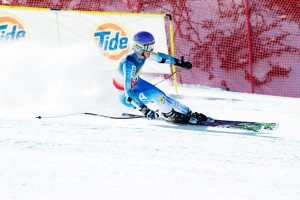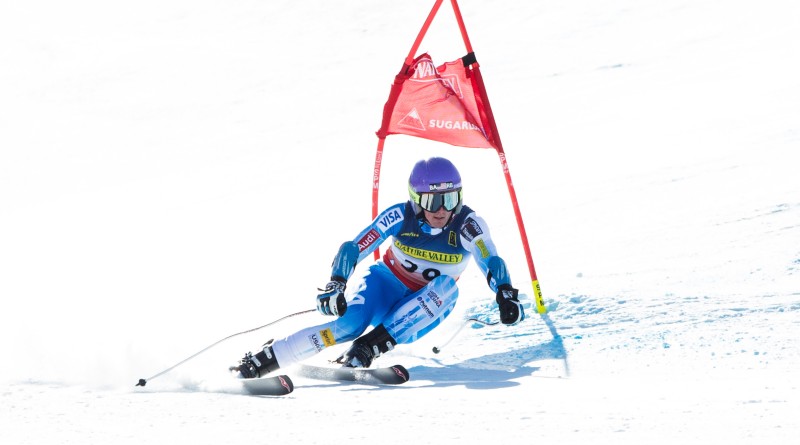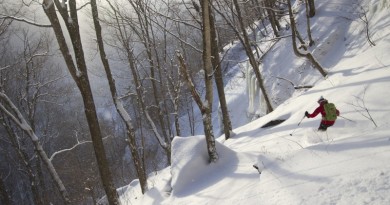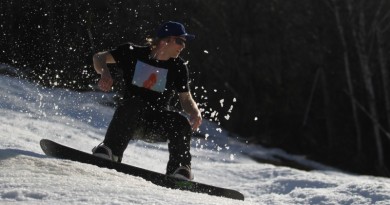Ski Racing’s Big Surprise
After watching two friends die in an avalanche Drew Duffy had a dismal season. No one expected what happened next. — By Biddle Duke
On the morning of January 5, 2015, Drew Duffy, a 19-year-old from Warren, Vt., woke up to another snowy day in Austria. For him and the other members of the U.S. Ski Team who had come to Solden to train, that wasn’t necessarily good news. Racing gates would be impossible in the pounding snowfall. So, instead, they headed to the top of the mountain for some deep powder runs.
On the first run, six of the world’s top skiers—five Americans and a Brit—dropped into an untracked slope off the glacier. It looked perfect. It was steep.
It was too perfect. The deep snow broke loose.
The massive avalanche swept up Duffy and his mates.
The avalanche battered down the slope, burying two of the group, Ronnie Berlack, a Burke (Vt.) Mountain Academy alum, and Bryce Astle, of Sandy, Utah. Astle and Berlack were Duffy’s close friends. He’d grown up racing against Berlack in Vermont. For years, they had both dreamed of making the national team.
After an intense search of the debris with probes, Astle and Berlack’s bodies were recovered.
Duffy’s ten years of racing and training has been a journey of successes and failures, of picking himself up and dusting himself off, of hard work, and perseverance. Over those years, the Duffy family had been scraping the money together so Drew, his sister and brother could pursue this expensive sport at the highest level.
In late spring of 2014, after a strong season, Duffy was named to the lowest rung on the U.S. Ski Team, the D Team. He trained hard that summer, and it paid off with a promising start in the season’s first big races in December in Canada. “I was feeling good, on a high coming out of those races,” he recounted recently.
After Christmas, he and his teammates arrived in Europe to prepare for a run of races. It had been a rocky start, weather-wise, in the Alps, with little snow, cancelled events and spotty chances to train. Then it began to snow, and snow and snow.
The January 5 avalanche mercilessly crushed his friends Astle and Berlack in what was reported to be as much as 15 feet of snow, crushing and then suffocating them. It also crushed Duffy with sadness and paralyzed his racing season.
Racing for him was suspended for almost a month. He resumed competing in late January but his best result over the next two months was a disappointing 16th in the Junior World Championships in Norway.
By the time U.S. Nationals came around in late March—where America’s top racers in every Alpine discipline would be crowned—Duffy was in a slump. The 2015 U.S. Nationals were held at Sugarloaf, Me. Duffy’s parents, Sean, a regional sales manager for a flooring company, and Betsy, a server at Warren’s The Pitcher Inn, had driven over from Vermont to watch the downhill portion held the week before, only to see him ski out of the course and not finish.
That was followed by five North American Cup races in Waterville, N.H. Again, Duffy failed to finish in all of them, either falling or skiing out of the gates, except for a Super-G, where he placed a disappointing 19th.
His parents decided to skip the rest of the Nationals and instead take their daughter, Anna, another promising young skier, to races in Canada. Ordinarily, the couple would not have missed Nationals. Both are passionate about the sport and their kids’ successes with it: older son, Danny, is a former U.S. Ski Team member who will race for St. Michael’s College this season. The couple routinely take time away from their working lives to be at every possible finish line for their children.
In this case, they would have split up, with Betsy going to one child’s event, and Sean Duffy to the other. “But given how Drew had done up to then we decided to both go to Canada,” Betsy Duffy said.
Duffy’s season seemed cursed. In keeping with how things had been going, at Sugarloaf he pulled bib number 30 in the draw for his favorite event, the Super-G. Bibs are handed out in groups of 15. The first seed, with stars like Ted Ligety and Steve Nyman, would receive bibs one through 15. The second seed, which would include lower-ranked ski teamers and other top racers, would run 16 through 30. Everyone else would run after that based on their rankings.
If you were in the second seed like Duffy was you’d hope for bib 16, maybe 20 at worst. Bib 30 would have him running at the very back of the lead pack, probably with a rougher course and the race already decided from among the early starters.

2015 Nature Valley U.S. Alpine Championships at Sugarloaf Mountain, Maine
Photo: USSA
Duffy took it in stride. “Starting 30th was a good thing. I was around guys I could beat and everything just felt good. I was in a little bit of a slump going into it, so I told myself I just want to ski and not overthink it.”
By the time Duffy was on course, three veterans of the U.S. Ski Team, who had started 4th, 6th and 7th, were being congratulated for their victories in the sunny finish area. Thirty-three-year-old Steve Nyman, with a downhill World Cup victory and several World Cup Super-G podiums earlier in the season, was the apparent winner with a time of 1:19.77. No one was likely to challenge that time; the edge and excitement had faded in finish-area announcer Peter Graves’s voice. The podium line-up had been decided.
Then Duffy’s interval times began appearing on the big timing screen at the finish and the crowd began to shift their attention back to the race course. Duffy was skiing fast and clean. It was unheard of, but a guy running 30th was actually a serious threat.
Then the young Vermonter came through the finish a stunning .04 seconds ahead of Nyman. As he pulled up, Duffy looked at the timing screen and smiled calmly.
“Cool,” he said, looking slightly unsure of his own victory.
A second later he was swarmed by coaches and fans.

2015 Nature Valley U.S. Alpine Championships at Sugarloaf Mountain, Maine
Photo: USSA
Sean, Betsy and Anna Duffy had spent the day driving north to a ski resort in Canada. Due to poor cell service and other interruptions they hadn’t checked the results online. That night, long after their son was crowned national Super-G champion, a friend approached them in a hotel lobby.
“Congratulations on Drew’s result today,” the friend said.
“Huh?” the Duffy clan responded collectively. But soon they were jumping up and down in elation. “Imagine,” Betsy told me later, “that’s how we learned Drew had won.”
The Nationals were a turning point. Duffy would go on to win another major Super-G in Aspen a few weeks later and finish second in a downhill.
Part of the inexplicable magic of this story is that Duffy was convinced that his friends Berlack and Astle were with him all along. In both runs of the two-run downhill Duffy felt a tailwind. It blew only for him.
“It was Ronnie and Bryce blowing me down the hill,” he said.
“I don’t want to take away from my results because I was skiing really well, but each time I kicked out of the starting gate the wind picked up… Regardless of whether or not they gave me a tail wind, they made me mentally stronger.”
Duffy was moved up to the National C Team this past May based on his international rankings. “I had a lot of confidence after Nationals and I capitalized on the opportunities that I had knowing that the guys were right there with me.”
Drew Duffy is aiming for his first World Cup race start this season.





Pingback: Vermont Ski + Ride Season Preview | Fall 2015
There never was a more fitting result for a nicer or more deserving athlete than this.
Truth!
Pingback: Lake Placid's Boy Kills it at the Hahnenkamm - VT SKI + RIDE